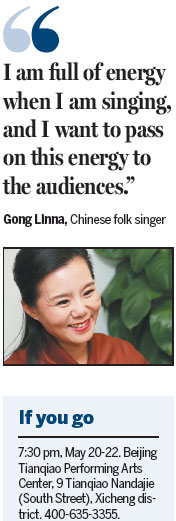

Chinese folk singer Gong Linna hopes to give audiences in Beijing a new perspective of her music. Backed by her husband, German composer Robert Zollitsch, Gong hopes to show the artistic value of the pieces, which she feels is often missed. Chen Nan reports.
In 2011, Chinese folk singer Gong Linna's lyric-less song, Tan Te, or Perturbed, was one of the most controversial and talked-about songs on the internet.
The tune, which broke all the rules of Chinese folk music, brought Gong instant fame.
|
Gong Linna's performance of the song The Lord in the Clouds at the Bang on a Can in New York concert wins rave reviews. Provided to China Daily |
The 41-year-old, who has also performed songs like Fa Hai, You Don't Understand Love and Golden Stick, is popular because she has a powerful voice, a wide vocal range and produces dramatic facial expressions when she sings.
Her popularity has also helped her husband, 48-year-old German composer Robert Zollitsch, who Gong calls Lao Luo, share the limelight.
Zollitsch, who plays the guqin (Chinese zither) and has been researching and writing Chinese folk songs for the past 20 years, is credited with writing her "unconventional" songs.
The couple will stage a concert in Beijing over May 20-22, which will give audiences a different perspective of their music.

"The songs that have made me popular are just one facet of me. The audiences enjoy the songs because they are entertained, but the artistic value of the pieces is often missed. It's time to give them the whole picture," Gong tells China Daily in Beijing.
Titled Five Elements of Love, the concert, directed by Zollitsch, uses the wu xing theory, which contains five elements - wood, fire, earth, metal and water - to symbolize the energy expressed through the music.
The couple calls their compositions "China new art music". They use elements from Chinese music and literature to create contemporary works.
Since last year, the duo has been working on turning Tang (AD 618-907) and Song (960-1279) dynasties' poems into modern songs.
Gong will perform songs adapted from works by such ancient poets as Li Bai and Du Fu in her upcoming concert.
She will also interpret folk songs from different regions of China.
Meanwhile, Gong's musical experiments are moving beyond the mainland.
Last June, she was part of a marathon concert called Bang on a Can in New York, a music project launched by composers Michael Gordon, David Lang and Julia Wolfe in 1987, which aims to break barriers that separate music communities.
Her performance of the song, The Lord in the Clouds, composed by Zollitsch and the founders of Bang on a Can won rave reviews globally.
The New York Times said that "whether belting, keening or murmuring, insinuating or girlish, Ms Gong is a star".
The song is also a part of Zollitsch's latest work, which is inspired by famous Chinese poet Qu Yuan's Chu Ci Anthology.
Speaking of her husband's work, Gong, who met Zollitsch in Beijing in 2002, says: "As a foreigner, he reads more Chinese books than I do. And he often surprises me with his bold musical ideas."
A versatile singer since childhood, Gong, who studied folk music at the Chinese Conservatory of Music in Beijing, held her first solo concert in 1999 with the China Central Nationalities Orchestra, China's most prestigious traditional music orchestra.
In 2000, she won the Chinese National Singing Competition and became a popular figure.
"But I was not happy because all the singers then were lip-synching," she says.
Recalling an embarrassing moment onstage, she says: "Once, when I was performing at a gala in my beautiful gown and heels, I suddenly forgot the lyrics.
"I then tried to calm myself down, smile and pretended to sing.
"But I felt so ashamed when the audience began to applaud at the end of my performance. Nobody knew that I had just been counting numbers rather than singing."
Zollitsch has an opinion of her beyond her humility and down-to-earth attitude.
He says: "When we first met, I was impressed by her voice.

"At the beginning, I challenged her a lot - like making her sing with live bands instead of karaoke tapes.
"The songs I wrote are not easy to sing, but she soon found her voice and also has independent ideas."
In 2004, the couple moved to Berlin and had two children there in 2005 and 2008.
Now based in Beijing with her family, Gong says that she spends two hours every morning harnessing qi to maintain her breath.
"I am full of energy when I am singing, and I want to pass on this energy to the audiences, and especially I want younger kids enjoy this kind of music."
Contact the writer at chennan@chinadaily.com.cn